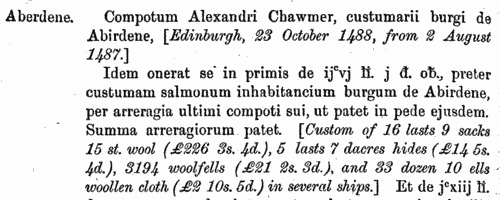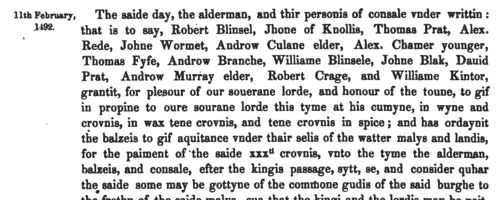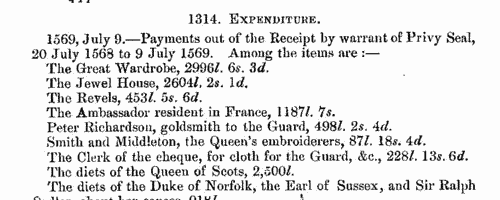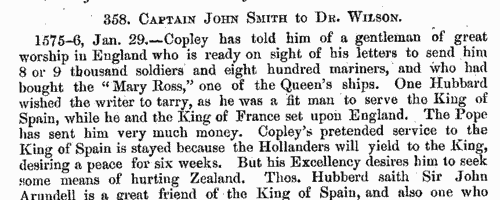Gordon Surname Ancestry ResultsOur indexes 1000-1999 include entries for the spelling 'gordon'. In the period you have requested, we have the following 2193 records (displaying 11 to 20): Single Surname Subscription | | | Buying all 2,193 results of this search individually would cost £12,474.00. But you can have free access to all 2,193 records for a year, to view, to save and print, for £100. Save £12,374.00. More... |
These sample scans are from the original record. You will get scans of the full pages or articles where the surname you searched for has been found. Your web browser may prevent the sample windows from opening; in this case please change your browser settings to allow pop-up windows from this site. Officers and tenants of the Scottish crown
(1488-1496)
In 1887 the 10th volume of Rotuli Scaccarii Regum Scotorum, or The Exchequer Rolls of Scotland, was published in Edinburgh as part of the Scottish Series of Chronicles and Memorials. The main text is a transcript in extended Latin, but with some passages reduced to an abstract in English (in italics), of the rolls of the Scottish royal exchequer from 19 June 1488 to 12 October 1496 (rolls cclxxviii to ccxcv, old numbers ccxciii to cccix). This more or less continuous series alternates between accounts of the Ballivi ad Extra (royal chamberlains, lessees of lordships, rangers of wards, receivers &c) and those of the Custumars (receivers of customary payments and similar revenues) and bailies (bailiffs) of burghs (boroughs). In all, they give a summary description of all these sources of royal revenue - and not only mention the payers and receivers in general, but also refer to many occasional payments to and receipts from individuals hardly otherwise found in the surviving records. An appendix (pages 629 to 763) of rentals of royal property throughout Scotland in the same period gives a rich harvest of personal names; and another (764-772), an Index in Libros Responsionum, lists persons to whom sasine (seisin) was granted in 1492 to 1496.GORDON. Cost: £4.00.  | Sample scan, click to enlarge

| Yorkshire Testators and Legatees
(1484-1508)
Wills and testaments from the diocese of York (Yorkshire, Nottinghamshire, Hexhamshire, Lancashire north of the Ribble, and southwest Westmorland) registered at York. Richmond and Southwell archdeaconries had their own lower probate jurisdictions, so the wills registered at York are predominantly from the East and West Ridings and the eastern part of the North Riding of Yorkshire. In theory, wills dealt with real property and testaments with personal property, but the distinction hardly applies in practice: most of these wills are in Latin, but some are in English. Being before the Reformation, they commonly start with benefactions to churches, chantries, chapels, &c., and with provisions for the burning of candles ('lights') and saying of masses. This publication in 1869 by the Surtees Society as Testamenta Eboracensia iv is an edition by James Raine of selected wills from the period. Some additional material is included from the Prerogative Court of Canterbury and the York Dean and Chapter archives.GORDON. Cost: £4.00.  | Sample scan, click to enlarge

| Liegemen and Traitors, Pirates and Spies
(1542-1547)
The Privy Council of Henry VIII was responsible for internal security in England and Wales, and dealt with all manner of special and urgent matters
GORDON. Cost: £4.00.  | Sample scan, click to enlarge

| Scottish litigants, rebels and cautioners
(1545-1569)
The Privy Council of Scotland exercised a superior judicial authority in the kingdom, and consequently received and dealt with a constant stream of petitions, as well as dealing with the internal security of the state. This register of the council from June 1545 to July 1569, in the reigns of Mary queen of Scots and king James VI, was edited by John Hill Burton, Historiographer Royal for Scotland, and published under the direction of the Lord Clerk Register of Scotland in 1877. Some of the individuals mentioned are the complainants, those of whom they complained, and the sureties on both sides: at this period, some of the complainants are alleging serious attacks, often of a feuding nature. Many of the bonds entered into by the cautioners are promises to keep the peace towards such enemies. Failure to answer to the council when summoned was a serious contempt, leading to being denounced a rebel, with serious consequences. But 'horning' was also used in the pursuit of debts: there was no imprisonment for debt in Scotland, but a creditor could have an obstinate debtor ordered, in the sovereign's name, to pay what was due, failing which, the debtor could be put to the horn, denounced as a rebel, and imprisoned as a rebel. In his preface to this volume, Burton remarked that "There might perhaps be objections to the abundance of names of persons and places unknown to fame; but it was considered that in such a work the proper names of all persons and places occurring in the Register should be preserved, to be at the service of genealogical as well as historical investigators".
GORDON. Cost: £4.00.  | Sample scan, click to enlarge

| Inhabitants of Aberdeen
(1398-1570)
Extracts from the first 27 surviving volumes of Aberdeen burgh (borough) records were made by John Stuart for the Spalding Club and published in 1844. Although it is believed that the town records were preserved on parchment rolls until about 1380, and in book form thereafter, by 1591 the town clerk remarked that there existed of the earliest records only 'peces and partis of four ald imperfyt and informall buikis conumitt and eitten be mothes, for aldnes and antiquite euill to be red, yit to be keipit for a monument be resoun of the antiquite'. The regular series of books surviving comprised 61 folio volumes from 1398 to 1745, and these contained the proceedings of the Council of the Burgh, of the Baillie Court, and the Guild Court.GORDON. Cost: £4.00.  | Sample scan, click to enlarge

| Cecil Manuscripts
(1540-1571)
Letters and papers of the Earl of Hertford and (1551-1571) sir William Cecil, Secretary of State. Also includes some miscellaneous material as early as 1306.GORDON. Cost: £4.00.  | Sample scan, click to enlarge

| Scottish litigants, rebels and cautioners
(1569-1578)
The Privy Council of Scotland exercised a superior judicial authority in the kingdom, and consequently received and dealt with a constant stream of petitions, as well as dealing with the internal security of the state. This register of the council from July 1569 to June 1578, in the reign of king James VI, was edited by John Hill Burton, Historiographer Royal for Scotland, and published under the direction of the Lord Clerk Register of Scotland in 1878. Some of the individuals mentioned are the complainants, those of whom they complained, and the sureties on both sides: at this period, some of the complainants are alleging serious attacks, often of a feuding nature. Many of the bonds entered into by the cautioners are promises to keep the peace towards such enemies. Failure to answer to the council when summoned was a serious contempt, leading to being denounced a rebel, with serious consequences. But 'horning' was also used in the pursuit of debts: there was no imprisonment for debt in Scotland, but a creditor could have an obstinate debtor ordered, in the sovereign's name, to pay what was due, failing which, the debtor could be put to the horn, denounced as a rebel, and imprisoned as a rebel.
GORDON. Cost: £4.00.  | Sample scan, click to enlarge

| Scottish litigants, rebels and cautioners: excluded names
(1569-1578)
The Privy Council of Scotland exercised a superior judicial authority in the kingdom, and consequently received and dealt with a constant stream of petitions, as well as dealing with the internal security of the state. This register of the council from July 1569 to June 1578, in the reign of king James VI, was edited by John Hill Burton, Historiographer Royal for Scotland, and published under the direction of the Lord Clerk Register of Scotland in 1878. Some of the individuals mentioned are the complainants, those of whom they complained, and the sureties on both sides: at this period, some of the complainants are alleging serious attacks, often of a feuding nature. Many of the bonds entered into by the cautioners are promises to keep the peace towards such enemies. Failure to answer to the council when summoned was a serious contempt, leading to being denounced a rebel, with serious consequences. But 'horning' was also used in the pursuit of debts: there was no imprisonment for debt in Scotland, but a creditor could have an obstinate debtor ordered, in the sovereign's name, to pay what was due, failing which, the debtor could be put to the horn, denounced as a rebel, and imprisoned as a rebel. In his preface to the first volume, Burton remarked that "There might perhaps be objections to the abundance of names of persons and places unknown to fame; but it was considered that in such a work the proper names of all persons and places occurring in the Register should be preserved, to be at the service of genealogical as well as historical investigators". But by this, second, volume, he decided that complete coverage was impractical, with "the crowding in of proper names, all but a few being the names of obscure persons ... Borderers are called up in considerable groups, and ordered to find, or recorded as having found, sureties for giving compensation to persons plundered, or for good conduct for the future. Several burgesses are sometimes entered in a minute about a Corporation quarrel. When the particulars of unimportant private litigations are omitted, the names remain." He therefore devised this 'Index of Names excluded from the Text', giving name, conditions, and date in register.
GORDON. Cost: £4.00.  | Sample scan, click to enlarge

| Cecil Manuscripts
(1572-1582)
Letters and papers of William Cecil lord Burghley, Lord Treasurer. Includes some other material as early as 1553.GORDON. Cost: £4.00.  | Sample scan, click to enlarge

| Scottish litigants, rebels and cautioners
(1578-1585)
The Privy Council of Scotland exercised a superior judicial authority in the kingdom, and consequently received and dealt with a constant stream of petitions, as well as dealing with the internal security of the state. This register of the council from 17 June 1578 to 31 July 1585, in the reign of king James VI, was edited by David Masson, and published under the direction of the Lord Clerk Register of Scotland in 1880. Some of the individuals mentioned are the complainants, those of whom they complained, and the sureties on both sides: at this period, some of the complainants are alleging serious attacks, often of a feuding nature. Many of the bonds entered into by the cautioners are promises to keep the peace towards such enemies. Failure to answer to the council when summoned was a serious contempt, leading to being denounced a rebel, with serious consequences. But 'horning' was also used in the pursuit of debts: there was no imprisonment for debt in Scotland, but a creditor could have an obstinate debtor ordered, in the sovereign's name, to pay what was due, failing which, the debtor could be put to the horn, denounced as a rebel, and imprisoned as a rebel. The main text (to page 762) is from the Acta Secreti Concilii, containing the minutes of the Privy Council, and of occasional Conventions of the Estates. After that are printed some miscellaneous Privy Council documents from the same years. The sources most productive of names, the Acta Cautionis and Registration of Bands, are also the most repetitive in form, and are not transcribed verbatim and literatim: nevertheless, one of the editor's rules was for 'All proper names and names of places occurring in the originals to be preserved in the abstracts without exception, and in the exact original spelling.'
GORDON. Cost: £4.00.  | Sample scan, click to enlarge

|
Research your ancestry, family history, genealogy and one-name study by direct access to original records and archives indexed by surname.
|












